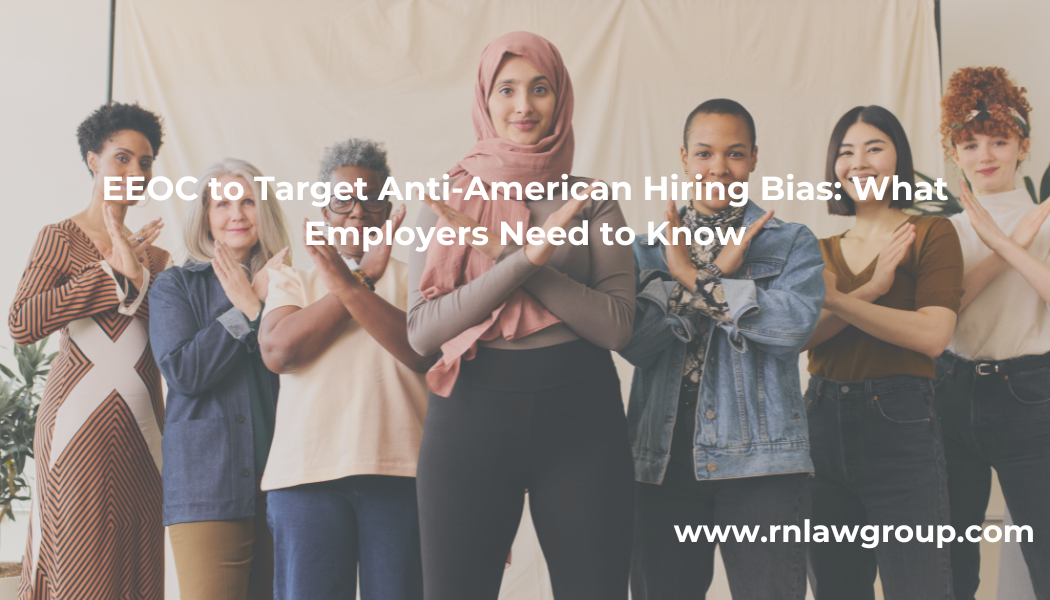
EEOC to Target Anti-American Hiring Bias: What Employers Need to Know
Understanding the EEOC’s Role in Preventing Workplace Discrimination
The Equal Employment Opportunity Commission (EEOC) is the federal agency responsible for enforcing laws that prohibit workplace discrimination. Established by the Civil Rights Act of 1964, the EEOC investigates complaints of discrimination based on race, color, religion, sex (including pregnancy, sexual orientation, and gender identity), national origin, age, disability, and genetic information. The agency also enforces laws protecting workers from retaliation for reporting discrimination or participating in an investigation. Through legal guidance, employer training, and litigation, the EEOC ensures fair treatment in hiring, promotions, wages, and workplace policies across private and public sector employers.
EEOC’s New Focus on Anti-American Hiring Bias
The EEOC’s focus on anti-American bias marks a notable shift from its usual enforcement priorities, which traditionally center on protecting individuals from discrimination based on race, national origin, gender, age, disability, and other protected characteristics. While the agency has long addressed national origin discrimination under Title VII of the Civil Rights Act, this new initiative uniquely emphasizes protecting U.S. workers from being disadvantaged in hiring and employment decisions due to their citizenship or national origin. Typically, the EEOC’s actions aim to prevent bias against historically marginalized groups, but this focus on anti-American discrimination signals an effort to ensure that U.S. citizens are not unfairly excluded from job opportunities due to an employer’s preference for hiring foreign workers through visa programs.
Federal Laws That Prohibit Hiring Discrimination
The EEOC has the authority to bring legal action against employers under several key federal laws that prohibit workplace discrimination. These include Title VII of the Civil Rights Act of 1964, which bars discrimination based on race, color, religion, sex (including pregnancy, sexual orientation, and gender identity), and national origin; the Age Discrimination in Employment Act (ADEA), which protects workers aged 40 and older; the Americans with Disabilities Act (ADA), which prohibits discrimination against individuals with disabilities; the Equal Pay Act (EPA), which mandates equal pay for equal work regardless of sex; and the Genetic Information Nondiscrimination Act (GINA), which prevents discrimination based on genetic information. The EEOC enforces these laws against private employers with at least 15 employees (or 20 employees for age discrimination cases), as well as federal, state, and local government employers, unions, and employment agencies. When an employer violates these laws, the EEOC can file lawsuits in federal court to seek remedies such as back pay, reinstatement, policy changes, and punitive damages.
Employer Compliance: Hiring Foreign Workers Without Violating Anti-Discrimination Laws
Employers who sponsor foreign workers on work visas must carefully navigate anti-discrimination laws to ensure compliance with both immigration and employment regulations. Under Title VII of the Civil Rights Act, employers cannot favor or exclude job applicants based on national origin or citizenship status unless explicitly required by law. Additionally, the Immigration and Nationality Act (INA), enforced by the Department of Justice’s Immigrant and Employee Rights (IER) Section, prohibits discrimination based on citizenship status in hiring, firing, or recruitment. This means that while employers may legally hire foreign workers through visa programs such as H-1B, L-1, or PERM-based sponsorship, they must avoid unlawfully preferring foreign workers over equally qualified U.S. workers. To comply, employers should:
- Follow non-discriminatory hiring practices, ensuring that job postings and recruitment efforts do not improperly exclude U.S. workers.
- Properly document the labor certification process, demonstrating that they have genuinely attempted to recruit U.S. workers before hiring foreign employees.
- Avoid citizenship-based discrimination when considering job applicants, except when a lawful government requirement mandates hiring a U.S. citizen.
- Ensure consistent pay and working conditions for both foreign and U.S. workers to prevent unfair labor practices.
Failure to adhere to these regulations can lead to EEOC investigations, Department of Justice penalties, and immigration compliance violations, putting an employer’s visa sponsorship privileges at risk.
Final Thoughts: The Future of EEOC Enforcement on Hiring Practices
The EEOC’s shift to investigating anti-American hiring bias aligns with the Trump administration’s America First campaign promises. Throughout his campaign and prior presidency, Donald Trump emphasized protecting U.S. jobs from foreign competition, particularly in industries that rely heavily on visa programs such as H-1B and PERM sponsorship. This initiative reinforces that U.S. workers should not be disadvantaged in favor of foreign hires, ensuring that employers comply with both immigration and employment laws while prioritizing qualified American candidates. While the EEOC continues to uphold protections for historically marginalized groups, this focus on anti-American discrimination reflects a broader policy stance that seeks to safeguard job opportunities for U.S. citizens. Employers must remain vigilant in their recruitment processes, ensuring they do not unintentionally violate anti-discrimination laws while legally hiring foreign talent. By implementing clear, non-discriminatory hiring policies and maintaining proper documentation, employers can stay compliant while aligning with the administration’s push to strengthen protections for American workers.
By: Emily Neumann
Emily Neumann is Managing Partner at Reddy Neumann Brown PC. with over 15 years of experience practicing US immigration law providing services to U.S. businesses and multinational corporations. Emily has helped transform the firm from a solo practice to Houston’s largest immigration law firm focused exclusively on U.S. employment-based immigration. She received her Bachelor’s degree in Biology from Central Michigan University and her Juris Doctorate degree from the University of Houston Law Center. Emily has been quoted in Bloomberg Law, U.S. News & World Report, Inside Higher Ed, and The Times of India on various hot topics in immigration. She is a member of the American Immigration Lawyers Association and Society for Human Resource Management.
In today’s global economy, being able to navigate the immigration process is critical to your business success. If you are a Legal Dreamer ageing out, speak with one of our immigration lawyers. Please contact us online, call our Houston business immigration attorney office directly at 713-953-7787, or schedule a consultation.

